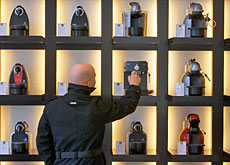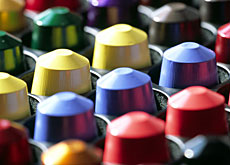Nespresso drinks to 20 years

Nespresso, which claims to offer "the ultimate coffee experience" with its distinctive capsules and coffee machines, is celebrating its 20th birthday.
The company, one of the fastest-growing businesses of the Swiss food giant Nestlé, has an annual growth of 30 per cent and is expecting a turnover of more than SFr1 billion ($810 million) by 2007.
Nespresso is an attempt by Nestlé to turn Italian coffee culture into a well-packaged Swiss concept, offering small sealed “Grand Cru” coffee capsules, stylish modern coffee machines and a personalised door-to-door 24-hour delivery service.
By 2005 its coffee capsule system had managed to become one of the top ten domestic brands – and its popularity is still rising.
Over the past five years Nespresso has experienced more than 30 per cent compound annual growth. The company is a market leader in premium coffee and, with a 16.6 per cent market share in 2005, the European market leader for espresso machines.
But the coffee firm is setting its sights even higher and hopes to become a billion-franc company by the end of 2006.
“And longer term Nespresso is well on course to hit the SFr2 billion Swiss franc revenue mark by 2010,” Gerhard Berssenbrügge, Nespresso’s CEO, said in March 2006.
As part of the company’s strategy to build a global brand, this year Nespresso enlisted the services of Hollywood star George Clooney to boost sales in an advertising campaign.
Cost
When Nespresso was launched, environmentalists criticised the system as they argued the aluminium coffee capsules generated too much waste. Since then the capsules have been made recyclable.
The individual portions are easy to use and the price of a cup of coffee is quite steep. While you might spend around ten cents on a cup of home-brewed conventional coffee, a cup of Nespresso costs about five times more.
Nestlé’s concept of pricy individual portions is similar to the system of colour cartridges for computer printers. Cartridges for printers are normally incompatible with other printers.
For this reason Nespresso’s capsules do not fit into coffee machines by other manufacturers, which have since come up with similar systems.
Nestlé has, however, allowed other manufacturers, including Turmix, Jura, Miele and Siemens, to produce Nespresso machines, allowing Nespresso capsules to cross borders easily.
Earlier in November Nespresso announced it was investing around SFr150 million in a new production centre in Avenches in western Switzerland. The centre is set to employ 230 staff by 2010.
swissinfo
Nespresso is available in 35 countries.
Eastern Europe, Asia and South America are currently being developed as new markets.
The size of the capsules has never changed but other manufacturers are allowed to produce machines that fit the capsules.
The capsules are not sold to wholesalers.
Nespresso items are only sold in so-called boutiques and via the internet.
Nespresso was launched in 1988 and has enjoyed an annual growth of about 25 per cent.
In 2004, the company sold around 1.3 billion capsules.
By 2007, the company wants to achieve a turnover of SFr1 billion, and SFr2 billion by the end of the decade.
Nespresso employs over 1,300 people worldwide.
Nespresso belongs to Nestle’s “other food and drink” section, which grew in the first nine months of 2006 by 18 per cent to SFr2 billion.

In compliance with the JTI standards
More: SWI swissinfo.ch certified by the Journalism Trust Initiative









You can find an overview of ongoing debates with our journalists here . Please join us!
If you want to start a conversation about a topic raised in this article or want to report factual errors, email us at english@swissinfo.ch.